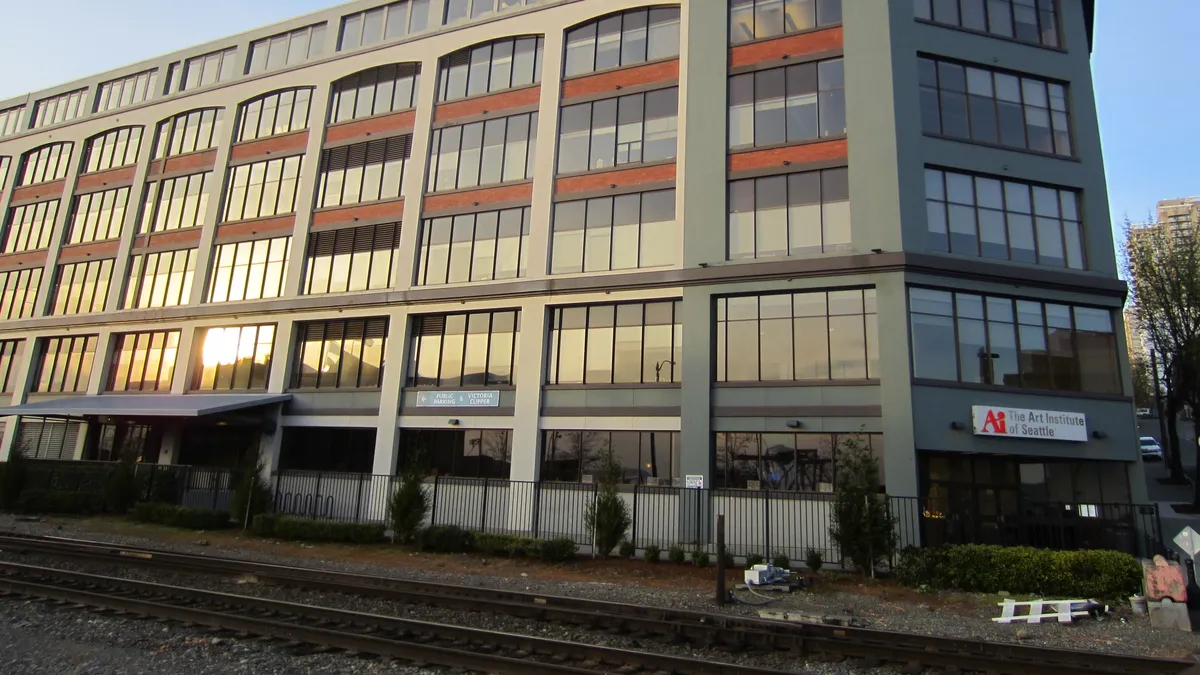Update: February 26, 2019: The receiver for Dream Center Education Holdings (DCEH) is suing the nonprofit Education Principle Foundation (EPF) as well as Studio Enterprise Manager over a deal that transferred control of eight Art Institutes and most South University colleges to EPF.
The receiver, Mark Dottore, said in a complaint filed Thursday that the contracts relating the acquisition were "unconscionable" and allowed Studio to "strip DCEH of all its valuable business assets." Dottore also alleged that DCEH was "forced into the Contracts by the U.S. Department of Education with the threat that the DOE would cut all funding to the schools unless the money flowed through Studio in the process set forth by the Contracts." In a separate motion, Dottore asked the court to force Studio to return around $6 million that DCEH has paid or is owed by the company since the spin off deal. Absent those funds, all of DCEH's remaining college systems will be forced to close, he said.
Dive Brief:
- In a court filing Friday, Dottore said there may have been "irregularities in the method and manner" in how its schools requested Title IV funding in the period leading up to DCEH entering receivership, which immediately followed the spin-off of several colleges to another nonprofit in January.
- Dottore alleged it "appears that amounts improperly requested by the pre-Receivership Dream Center Entities and then advanced by the [U.S.] Department of Education were not remitted to students, either before the submission of the request for payment (as was required), or after the money was received by the pre-Receivership Dream Center Entity." Instead the funds were used to pay operating expenses, he said.
- His report follows another filed earlier last week in which he said $13 million in unpaid student stipends for Argosy University students was not "missing" but rather DCEH, under receivership, "never had the money" because it had not been advanced by the Ed Department.
Dive Insight:
Answers remain scarce a little more than two weeks after initial reports that Argosy students had yet to receive federal student loan stipends owed to them, which they depend on to pay bills. As those students wait for both answers and money, students across DCEH's remaining schools — including Argosy, two South University campuses, and three operating Art Institutes and several more in teach-out — wait to learn the fates of those institutions.
In his filing Friday, Dottore said he was "troubled by persistent rumors" about the unpaid stipends. It is not immediately clear what "rumors" he was referring to. The issue of the unpaid stipends is well-documented. By Dottore's own account, they amount to $13 million owed to Argosy students.
The latest filing might seem to contradict his earlier report. But Dottore, in a Feb. 7 letter to top Ed Department official Diane Auer Jones, noted possible "windfalls" from $9 million in Title IV money to schools acquired in January by the nonprofit Education Principle Foundation (EPF) at the behest of the Ed Department. That, plus fees paid out to a for-profit educational services company, Studio Enterprise Manager (which is reportedly tied to EPF), put DCEH in a "dire" financial situation.
Dottore added Friday that he was in the "preliminary stages of a detailed, forensic investigation" and will examine the "exact methods used to trigger the advancement of these funds, the exact amount of the funds advanced and not paid over to students, and the persons involved in the procurement and uses of the Student Stipend funding."
The situation for DCEH's remaining students remains uncertain. Argosy and the Art Institute of Pittsburgh are both at risk of losing their accreditation. Landlords of the Pittsburgh and Las Vegas Art Institutes have also filed to intervene in the receivership case, the latter of which recently asked the court to force DCEH to either start paying rent again or reject the lease and leave the property. Another landlord, who is owed nearly half a million dollars in rent, has argued that the receivership was never legally valid.
DCEH faced insolvency in the weeks and months leading up to receivership and the deal to transfer some of its remaining healthy campuses to EPF. Acquiring the Art Institutes, Argosy and South University in bankruptcy from the for-profit Education Management Corporation proved financially and legally precarious, almost from the beginning.
As for-profit colleges merge, spin off and sell themselves, DCEH could serve as a cautionary tale of the complexities and risks involved in taking over troubled schools.














